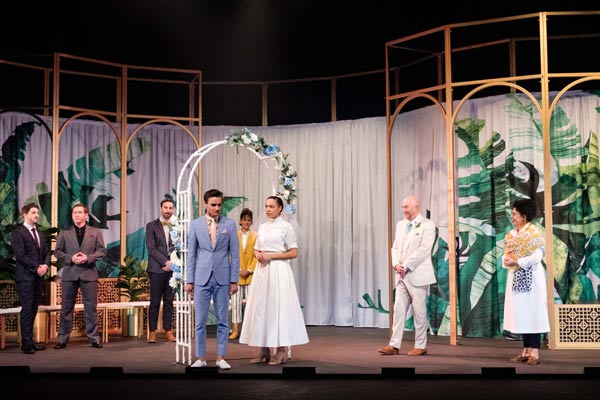Love is a battlefield in Shakespeare’s 'Much Ado About Nothing'.
The play is a comedy that explores the misadventures of two different couples and their companions. What ensues is a biting satire with some wry observations about identity, relationships and gender politics.
The Bell Shakespeare Company is renowned for their clever, modernist renderings of the Bard’s work. Their productions often straddle the lines between classic elements and contemporary sensibilities, and this is no exception. When this play was first written, the plot was often interpreted as poking fun at women. This was through anatomy (as suggested by the then interpretation of the title) and in the prose (where a woman is accused of cuckolding). In Bell Shakespeare’s case, the female characters are portrayed in a much bolder form. Some characters that were traditionally played by men are also performed by women, giving a fresh, new spin to the proceedings.
One of the big drawcards to James Evans’ production is actually the play's subplot and one that many mistake for the main event. That is, the relationship between two sharp-tongued people, Beatrice (Zindzi Okenyo) and Benedick (Duncan Ragg). The two actors do a fantastic job playing these strong individuals who constantly trade barbs. They also share a palpable chemistry. The witty one-liners and malapropisms yield many laughs. In essence, they start off loathing one another, only to have complete changes of heart when they realise that they like each other.
The other central relationship is between Claudio (Will McDonald) and Hero (Vivienne Awosoga). Bro culture and toxic masculinity are skewered for the terrible things that they are. Benedick – a character who is often so likeable for his wit – also engages in some silly, childish behaviour like hiding behind pot plants, his mental age seems to fluctuate from 70 to seven at any given moment.
© Clare Hawley
The set designed by Pip Runciman often seems rather vague. It’s a large, white, outdoor piece that could be a nice gazebo or a far richer person’s grounds. A rather gaudy curtain with tropical trees is used as a backdrop and this is supposed to be the coastline of Messina in Sicily. This often feels out of place, and distracts from the mystery and playfulness of the piece. Its overt tropical sunniness often takes away from the power of some of the subtler moments.
Runciman also designs the costumes here and uses lots of creams and pastels. The male characters often look like preppy and entitled rich boys in suits, which could suggest a modern time setting. Yet there is an occasional flourish, which looks like an '80s throwback (for example: florals and a tracksuit included in the mix). Andrée Greenwell’s soundtrack is inspired. It sees post-classical blends of pop and folk tunes that make the source material sing in a darkly comic way.
'Much Ado About Nothing' is a challenging play with some insights which remain relevant to contemporary audiences.
Its light comedy with serious undertones may appeal to people who enjoy an intelligent look at love and all its complications. While it is by no means groundbreaking, this show proves that appeal can be found in imperfections, misadventure and all.


